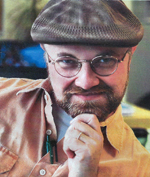By Eric George Tauber

SAN DIEGO — My students are half my age, so it’s not every day that I’m called “Sonny.” But what do you expect from a show called Old Jews Telling Jokes? There was the usual bickering, kvetching and “How the hell should I know where our seats are? You have the tickets,” said loudly enough for the whole audience to hear.
G. Bartelli goes to the piano accompanying John Rosen who sings like an old crooner in Vaudeville. The ensemble soon joins in and we’re on our way.
The jokes cover every aspect of life: birth, childhood, business, marriage, medicine, religion, sex… . You get the idea. They come one after another, pulling no punches and mincing no words. F*ing is f*ing, and they mean it literally. It’s a bit too ribald for kids, so hire a baby-sitter.
OJTJ is the brain-child of Dan Okrent and Peter Gethers. Not long ago, I spoke to Dan Okrent by phone…
DO: [The idea] came from a man named Sam Hoffman who works in the movie business. His parents and their friends were always telling jokes and he felt that he needed to preserve this oral tradition. So he filmed them. … Then he put them on the web and it became wildly popular. … About a year later, my friend Peter said, “Wouldn’t that make a great night club act?” … One thing led to another and soon we were in partnership with Broadway producers with a show that ran for sixteen months.
Into the mix were some touching and poignant personal stories showing how humor makes the spirit more resilient. Okrent commented on this during our interview.
DO: The role of humor in the lives of everybody -but in particular, Jews- is the way you deal with pain. When your life stinks, you try to make a joke about it. Otherwise, it’s just too awful. It goes back to Biblical times. Yitzhakh, Isaac, means “jester”. In 17th century Poland, the Badchen –who showed up at every wedding or bar mitzvah– was there to tell jokes almost in a Don Rickles way. The Tummler in every Jewish resort is always there and it’s always self-deprecating. We make fun of our mishegas and tzuris. So the more tzuris you have, the more potential you have to deflate that with humor. And we’ve had a lot of tzuris over the centuries.
While Dan Okrent wasn’t part of the San Diego casting, he told me what he was looking for in the New York and Chicago casts.
DO: Likeability was absolutely essential. While you didn’t have to be Jewish, you did have to understand Jewish sensibility, the shrug, the syntax and the phrasing that anybody who had a Jewish grandmother knows… And they had to be talented comics. There are a lot of great actors who can’t tell a joke and a lot of comics who can’t act. This is not stand-up, but you have to be able to tell a joke.
Director John Anderson hit the mark right on. The ensemble obviously enjoyed working together. Rhona Gold was especially delightful as she didn’t need to act, just be herself. Likewise, Bronx-native John Rosen was a natural fit and his easy-going manner makes him easy to watch.
The costumes by Anastasia Pautova were fun-lovingly hideous. Strong colors mixed with bold patterns, a plaid jacket and striped socks you couldn’t miss. I think the whole wardrobe came from Flashbacks in Hillcrest.
You don’t have to be Jewish to enjoy Old Jews Telling Jokes. You may not get all of the references, but the jokes come so rapid-fire that you don’t need to. The need to laugh is universal, especially in the midst of tsuris. So if your tsuris are getting you down, come see Old Jews Telling Jokes at the Lyceum Space in Horton Plaza. You’ll laugh your tuchus off.
*
Eric George Tauber is a freelance writer who specializes in the coverage of the arts. He may be contacted at eric .tauber@sdjewishworld.com